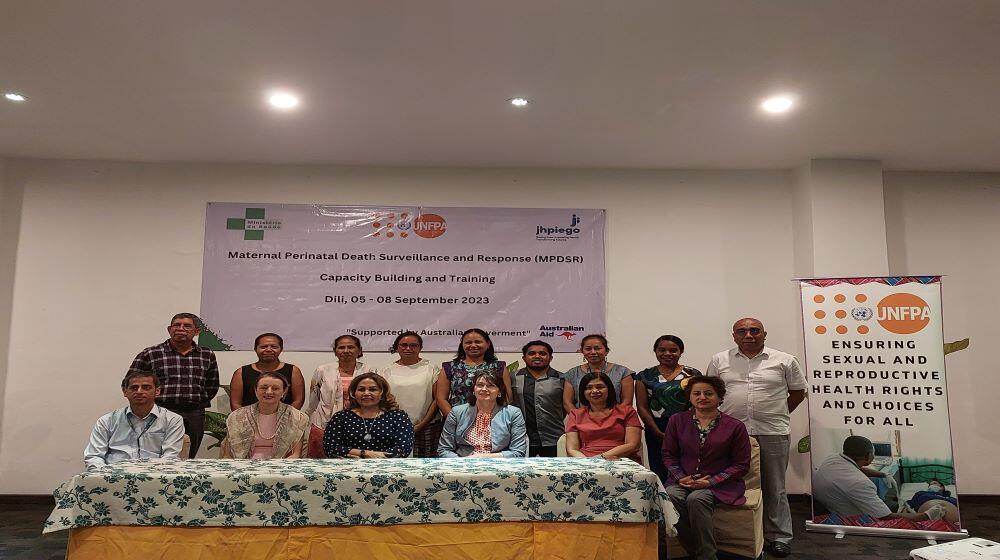Dili, September 12, 2023 -- To support strengthening of healthcare systems and surveillance into deaths during pregnancy, labour and after delivery in Timor-Leste, Australian Government through UNFPA Asia and Pacific Regional Office (APRO) supported a four-day training on Maternal and Perinatal Death Surveillance and Response (MPDSR) held at Hotel Timor in Dili.
Dr. Kusum Thapa, a senior technical adviser at Johns Hopkins Program for International Education in Gynecology and Obstetrics (Jhpiego) US, who was the main facilitator of the training team, noted that MPDSR is the process of evaluating causes of death of pregnant mothers and babies (0-28 days) to find causes and formulate interventions to improve quality of care for mothers and babies.
“MPDSR training aims to build capacity of frontline healthcare workers and managers to contribute to health outcomes and accelerate results to improve quality of care for mothers and babies, prevent maternal and newborn deaths and achieve sustainable development goals,” said Dr. Thapa during the training.
The training co-facilitated by UNFPA and UNICEF, and held from September 5 to 8, brought together 23 participants from the national hospital (HNGV), regional hospitals of Baucau and Maliana and community health center; Gleno, Maternal and Child Health Department in the Ministry of Health, UN agencies and partners.
“I have been able to learn about six cycles of MPDSR process; identification of information, collection, analysis, recommendation of action plan, implementation and evaluation of implementation that is critical to reduce maternal deaths and perinatal deaths.” said Dr. Estanislao Amaral, a medical doctor from the Pediatric Unit at the National Hospital of Timor-Leste (HNGV).
“Establishment of MPDSR committees is very important for health facilities to improve monitoring and systems surveillance – particularly at the national hospital where everyone has a busy schedule,” added Dr. Amaral.
As for Dr. Bernado Pinto, a medical doctor in the Obstetric and Gynecology unit from Baucau Regional Hospital (HOREX), the training provided updated health information that will help improve maternal health particularly prevention of maternal and newborn deaths.
“There is always new information in the dynamic medical field and this training has provided me with updated health information to identify the exact cause of deaths. The new knowledge that I have acquired from this training will enable me to clearly define, identify and make correct interventions to reduce and prevent the deaths of mothers and babies.
“It is very important so that everyone can have an understanding and knowledge of how data should be recorded and reported to help the government to provide the right interventions based on recommendations. Participants should also have continuous training for consistency of reporting and standardization of processes," said Dr. Pinto.
Estela F. D. Amaral, a midwife from Maliana Referral Hospital noted that through the training she has learnt the importance of observing one of MPDSR’s core principles of “no blame” to implement the knowledge without shifting blame to colleagues.
“It is important for other colleagues to understand MPDSR principles to reduce maternal and newborn deaths by seeking in-depth and updated knowledge. Follow-up meetings after three months or an exchange of experiences on MPDSR processes with colleagues can also contribute to a reduction of deaths and promote shared experiences and upscaling of training to other health professionals,” said Estela Amaral.
A strong and functioning MPDSR system is key to reducing maternal mortality – it gives information for action by promoting routine identification, timely notification and review of maternal and perinatal deaths, and response to prevent similar deaths in the future.
For more information, contact:
Suleiman Okoth
Communications and Programme Support Specialist
United Nations Population Fund (UNFPA), Timor-Leste
Mobile: +67075169796, Email; okoth@unfpa.org


